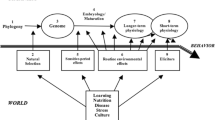Abstract
Unified explanations seek to situate the traits of human beings in a causal framework that also explains the trait values found in nonhuman species. Disunified explanations claim that the traits of human beings are due to causal processes not at work in the rest of nature. This paper outlines a methodology for testing hypotheses of these two types. Implications are drawn concerning evolutionary psychology, adaptationism, and anti-adaptationism.
Similar content being viewed by others
References
Allman J., Rosin A., Kumar R. and Hasenstaub A. 1998. 'Parenting and Survival in Anthropoid Primates - Caretakers Live Longer'. Proc. Natl. Acad. Sci. USA 95: 6866–6869.
Buss D. 1994. The Evolution of Desire - Strategies of Human Mating. Basic Books, New York.
Chomsky N. 1986. Knowledge of Language - Its Nature, Origins, and Use. Praeger, New York.
Daly M. and Wilson M. 1988. Homicide. Aldine de Gruyter, New York.
Felsenstein J. 1985. 'Phylogenies and the Comparative Method'.American Naturalist 125: 1–15.
Forster M. and Sober E. 1994. 'How to Tell when Simpler, More Unified, or Less Ad Hoc Theories will Provide More Accurate Predictions'. British Journal for the Philosophy of Science 45: 1–36.
Godfrey-Smith P. 1996. Complexity and the Function of Mind in Nature. Cambridge University Press, New York.
Gould S. 1991. 'Exaptation - A Crucial Tool for an Evolutionary Psychology'. Journal of Social Issues 47: 43–65.
Gould S. and Lewontin R. 1979. 'The Spandrels of San Marco and the Panglossian Paradigm - a Critique of the Adaptationist Programme' Proceedings of the Royal Society of London B. 205:, pp. 581-598.
Harvey P. and Pagel M. 1991. The Comparative Method in Evolutionary Biology. Oxford University Press, Oxford.
Lewontin R.C. 1982. 'Organism and environment'. In: Plotkin H. (ed.), Learning, Development, Culture. Wiley, New York.
Orzack S. and Sober E. 1994. 'Optimality Models and the Test of Adaptationism'. American Naturalist 143: 361–380.
Orzack S. and Sober E. 2001. 'Adaptation, Phylogenetic Inertia, and the Method of Controlled Comparisons'. In: Orzack S. and Sober E. (eds), Adaptationism and Optimality. Cambridge University Press, New York.
Pinker S. 1994.The Language Instinct. William Morrow, New York.
Pinker S. and Bloom P. 1990. 'Natural Language and Natural Selection'. Behavior and Brain Sciences 13: 764–765.
Sober E. 1993. Philosophy of Biology. Westview Press, Boulder.
Sober E. 1997. 'Is the Mind an Adaptation for Coping with Environmental Complexity? A Review of Peter Godfrey-Smith's Complexity and the Function of Mind in Nature'. Biology and Philosophy 12: 539–550.
Sober E. 2000. 'Evolution and the Problem of Other Minds'.Journal of Philosophy 97: 365–386.
Sober E. 2002. 'Reconstructing the Character States of Ancestors - a Likelihood Perspective on Cladistic Parsimony'. The Monist.
Sober E. and Orzack S. 2002. 'Common Ancestry and Natural Selection'. British Journal for the Philosophy of Science.
Tooby J. and Cosmides L. 1990. 'On the Universality of Human Nature and the Uniqueness of the Individual - the Role of Genetics and Adaptation'. Journal of Personality 58: 17–67.
Wilson D.S. 1994. 'Adaptive Genetic Variation and Human Evolutionary Psychology'. Ethology and Sociobiology 15: 219–235.
Author information
Authors and Affiliations
Rights and permissions
About this article
Cite this article
Lang, C., Sober, E. & Strier, K. Are human beings part of the rest of nature?. Biology & Philosophy 17, 661–671 (2002). https://doi.org/10.1023/A:1022560403398
Issue Date:
DOI: https://doi.org/10.1023/A:1022560403398




